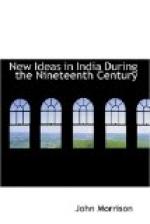The Indian Christian community occupies the peculiar position of sharing in the new-born national consciousness as strongly as any, and yet of being identified with the British side in the eyes of the Hindu and Mahomedan communities.
[Sidenote: Anti-British bias.]
[Sidenote: India ruled by Indians.]
Thus, almost inevitably, an anti-British bias has been generated, one of the noteworthy and regrettable changes in the Indian mind within the last half-century. Probably many would declare that the unifying national consciousness of which I have spoken is nothing more than a racial anti-British bias. At all events, hear an independent Indian witness regarding the bias.[41] “There is a strong and strange ferment working in certain ranks of Indian society.... Instead of looking upon the English rulers as their real benefactors, they are beginning to view their actions suspiciously, seizing every opportunity of criticising and censuring their rulers.... The race feeling between rulers and ruled, instead of diminishing, has increased with the increase, and spread with the spread, of literary education. That all this is more or less true at present cannot be denied by an impartial political observer.” An up-to-date illustration of the bias appears in the address of the Chairman of the National Congress of 1906. “The educated classes,” he says, “... now see clearly that the [British] bureaucracy is growing frankly selfish and openly opposed to their political aspirations.” While regretting that feeling and the prejudice that often mingles with it, let those interested in India at least understand the feeling. It is the natural outcome of the new national consciousness. Even educated natives are in general too ignorant of India, past and present, to appreciate the debt of India to Britain, and how great a share of the administration of India they themselves—the educated Indians—actually enjoy. For every subordinate executive position in the vast imperial organisation is held by a native of India, and “almost the entire original jurisdiction of Civil Justice has passed out of the hands of Europeans into those of Indians."[42] But the anti-British bias, let us on our part understand. The attitude of educated Indians to the British Government of India, and to Anglo-Indians as a body, is that of a political opposition, ignorant of many pertinent facts, divided from the party in power by racial and religious differences, and with no visible prospect of succeeding to office. The National Congress is the permanent Opposition in India. A permanent Opposition cannot but be biassed, and its press will seize at everything that will justify the feeling of hostility.




